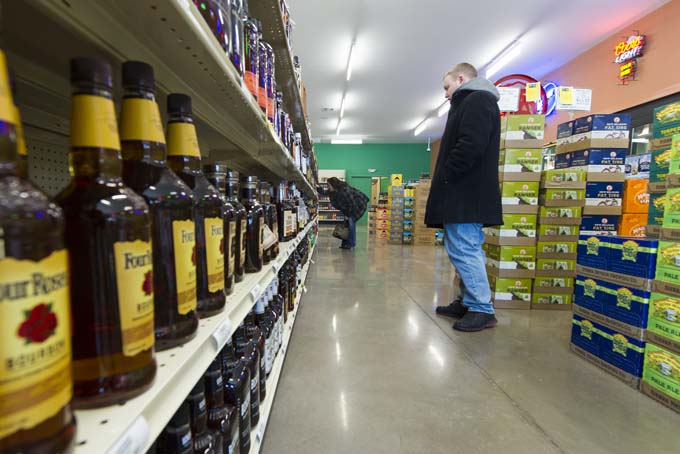
WILKINSBURG, Pa. (AP) — Grille 565, a restaurant that opened in August on Lincoln Avenue in Bellevue, gives away beer on Fridays because selling it would be against the law.
“It’s hard to pay the bills when you’re giving product away. … It’s a struggle, but we’re doing OK,” co-owner Jennifer Cirlingione said.
Groups in Wilkinsburg and Bellevue, both of which have been “dry towns” since 1935, are working to overturn laws prohibiting retail alcohol sales. In towns burdened by high commercial vacancy rates, legalizing alcohol sales in grocery stores, restaurants and other establishments could go a long way to energizing economic development, officials said.
Organizers in Wilkinsburg and Bellevue have collected enough petition signatures to get referendums on the May 19 ballot asking voters to allow retail alcohol sales. Beer distributorships and state stores are permitted.
“Chain restaurants and other businesses that have alcohol as part of their corporate model stay away from investing in Wilkinsburg,” said Salvatore Di Pasquale, co-owner of Salvatore’s Pizza House, a Wilkinsburg eatery that developed a foothold in the borough’s business district more than 30 years ago.
Based on their populations, Wilkinsburg would be eligible for five liquor licenses without municipal approval, and Bellevue would be eligible for two.
“It’s part of the business district revitalization plan and also part of our organization’s strategic plan to allow the liquor licenses, just to encourage more business development,” said Marlee Gallagher, communications and outreach coordinator for the Wilkinsburg Community Development Corp.
About 30 percent of the commercial spaces in Wilkinsburg’s business district are vacant; about 15 percent in Bellevue’s are. The average commercial vacancy rate in Western Pennsylvania is about 9 percent, according to Ernie Hogan, director of the Pittsburgh Community Reinvestment Group in the Hill District.
Bellevue succeeded in getting a referendum on the ballot in 2011, but it fell short of passing by 87 votes because of misinformation spurring public fears, said Aaron Stubna, who is helping lead the borough’s referendum effort.
“It’s frustrating when you get those who say, ‘We don’t need another South Side,’ ” said Stubna, referring to the Pittsburgh neighborhood known for its bar scene.
Stubna, who owns Lincoln Barber Shop on Lincoln Avenue, expects this year’s referendum to pass in Belle-vue because of a more concerted effort to educate the public through social media and a website. Public education, including town hall meetings, will be part of Wilkinsburg’s strategy, as well, said Gallagher.
If voters approve, restaurants with a liquor license must follow state law requiring them to principally sell food. The interior must be at least 400 square feet, equipped with at least 30 chairs.
Bellevue Mayor Paul Cusick opposed retail alcohol sales in the borough in 2011.
Today he’s undecided.
“Most of the other municipalities in the area do it, and it seems to be OK in most places,” Cusick said.
He would not have a problem with restaurants with liquor licenses.
“But I do have a problem with strictly bars because of the type of problems that are inherent with that type of establishment,” he said.
Longtime Bellevue resident Virginia Miranda, 80, voted no in 2011 and hasn’t changed her mind.
“I think it will turn Bellevue into a trash can,” she said.
Sidebar
There are 1,548 active liquor licenses in Allegheny County, which has exceeded its quota of 407 based on its population, so the Pennsylvania Liquor Control Board is not issuing new licenses.
Instead, any business seeking a license must receive a transfer from a business that no longer wants its license, said Shawn Kelly, spokesman for the board.
Based on its population of 8,370 people, Bellevue would be allowed two liquor license transfers if retail liquor sales become legal. Any more would require municipal approval, which would include a public hearing.
With its population of more than 15,000 residents, Wilkinsburg would be allowed five liquor license transfers without municipal approval.
Although the number of dry towns is decreasing, they are far from rare.
Of Pennsylvania’s 2,562 municipalities, 530, or 21 percent, including Bradford Woods, Ben Avon and Ingram, are dry for liquor and beer, Kelly said.
And 32 towns are dry for liquor, and 122, including Edgewood and Forest Hills, are dry for retail beer.
___
Online:
https://bit.ly/1CnGsvp
___
Information from: Pittsburgh Tribune-Review, https://pghtrib.com